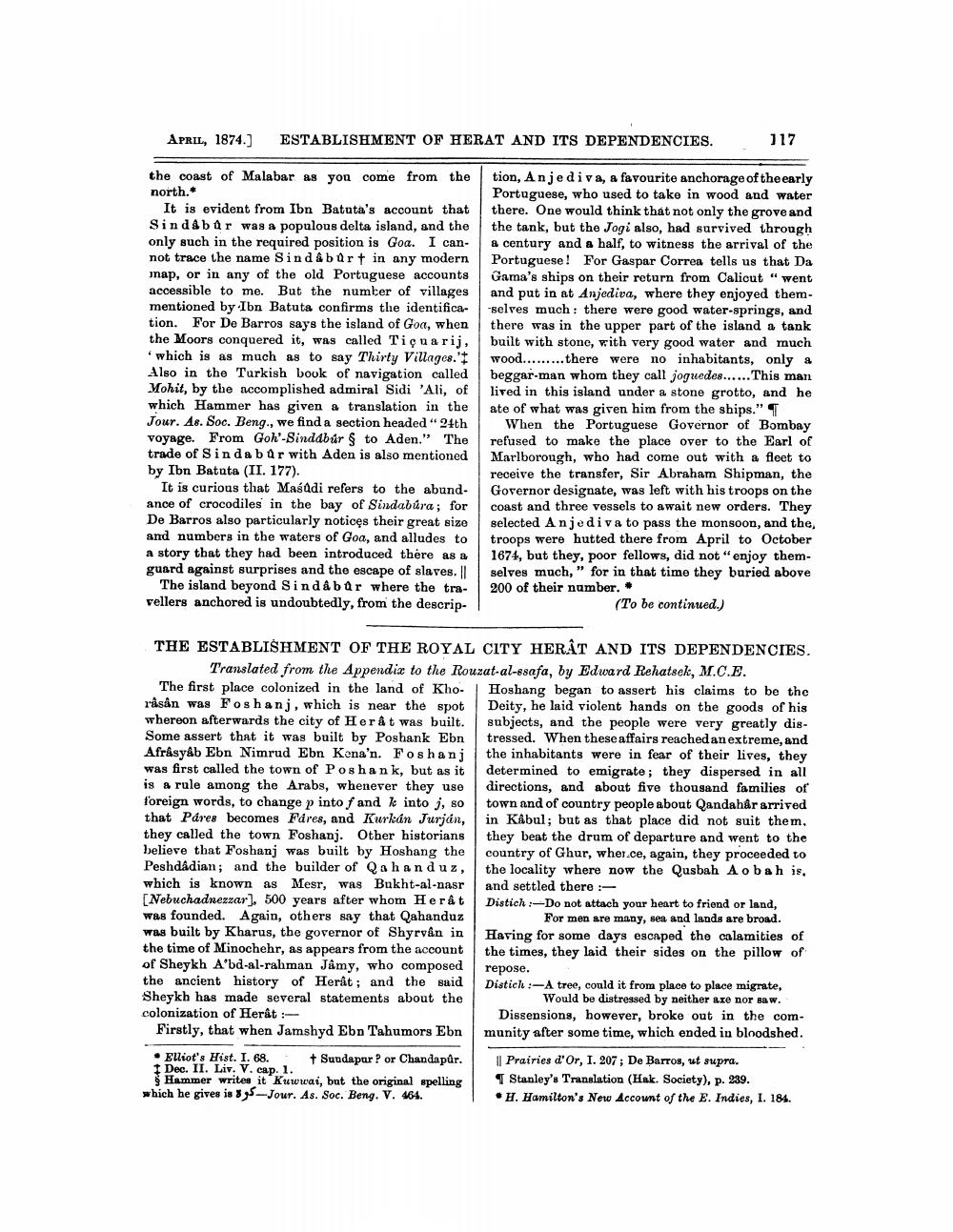________________
ESTABLISHMENT OF HERAT AND ITS DEPENDENCIES.
APRIL, 1874.]
the coast of Malabar as you come from the north.*
It is evident from Ibn Batuta's account that Sind&bar was a populous delta island, and the only such in the required position is Goa. I cannot trace the name Sindâ bûrt in any modern map, or in any of the old Portuguese accounts accessible to me. But the number of villages mentioned by Ibn Batuta confirms the identification. For De Barros says the island of Goa, when the Moors conquered it, was called Tiçuarij, which is as much as to say Thirty Villages." Also in the Turkish book of navigation called Mohit, by the accomplished admiral Sidi 'Ali, of which Hammer has given a translation in the Jour. As. Soc. Beng., we find a section headed "24th voyage. From Goh'-Sindabúr § to Aden." The trade of Sin da bar with Aden is also mentioned by Ibn Batuta (II. 177).
It is curious that Masûdi refers to the abundance of crocodiles in the bay of Sindabúra; for De Barros also particularly notices their great size and numbers in the waters of Goa, and alludes to a story that they had been introduced there as a guard against surprises and the escape of slaves. ||
The island beyond Sindâ bar where the travellers anchored is undoubtedly, from the descrip
The first place colonized in the land of Khorâsân was Foshanj, which is near the spot whereon afterwards the city of Herât was built. Some assert that it was built by Poshank Ebn Afråsyâb Ebn Nimrud Ebn Kena'n. Foshanj was first called the town of Poshank, but as it is a rule among the Arabs, whenever they use foreign words, to change p into f and k into j, so that Páres becomes Fdres, and Kurkán Jurján, they called the town Foshanj. Other historians believe that Foshanj was built by Hoshang the Peshdâdian; and the builder of Qahan duz, which is known as Mesr, was Bukht-al-nasr [Nebuchadnezzar], 500 years after whom Herât was founded. Again, others say that Qahanduz was built by Kharus, the governor of Shyrvån in the time of Minochehr, as appears from the account of Sheykh A'bd-al-rahman Jâmy, who composed the ancient history of Herât; and the said Sheykh has made several statements about the colonization of Herât :
Firstly, that when Jamshyd Ebn Tahumors Ebn
117
THE ESTABLISHMENT OF THE ROYAL CITY HERÂT AND ITS DEPENDENCIES.
Translated from the Appendix to the Rouzat-al-ssafa, by Edward Rehatsek, M.C.E.
Elliot's Hist. I. 68. + Sundapur? or Chandapûr. Dec. II. Liv. V. cap. 1. Hammer writes it Kuwwai, but the original spelling which he gives is 85-Jour. As. Soc. Beng. V. 464.
tion, Anje diva, a favourite anchorage of the early Portuguese, who used to take in wood and water there. One would think that not only the grove and the tank, but the Jogi also, had survived through a century and a half, to witness the arrival of the Portuguese! For Gaspar Correa tells us that Da Gama's ships on their return from Calicut "went and put in at Anjediva, where they enjoyed them-selves much there were good water-springs, and there was in the upper part of the island a tank built with stone, with very good water and much wood.........there were no inhabitants, only a beggar-man whom they call joguedes...... This man lived in this island under a stone grotto, and he ate of what was given him from the ships." T
When the Portuguese Governor of Bombay refused to make the place over to the Earl of Marlborough, who had come out with a fleet to receive the transfer, Sir Abraham Shipman, the Governor designate, was left with his troops on the coast and three vessels to await new orders. They selected Anje diva to pass the monsoon, and the, troops were hutted there from April to October 1674, but they, poor fellows, did not "enjoy themselves much," for in that time they buried above 200 of their number. *
(To be continued.)
Hoshang began to assert his claims to be the Deity, he laid violent hands on the goods of his subjects, and the people were very greatly distressed. When these affairs reached an extreme, and the inhabitants were in fear of their lives, they determined to emigrate; they dispersed in all directions, and about five thousand families of town and of country people about Qandahår arrived in Kâbul; but as that place did not suit them. they beat the drum of departure and went to the country of Ghur, wher.ce, again, they proceeded to the locality where now the Qusbah Aobah is, and settled there :
Distich:-Do not attach your heart to friend or land, For men are many, sea and lands are broad. Having for some days escaped the calamities of the times, they laid their sides on the pillow of
repose.
Distich:-A tree, could it from place to place migrate, Would be distressed by neither axe nor saw. Dissensions, however, broke out in the community after some time, which ended in bloodshed.
|| Prairies d'Or, I. 207; De Barros, ut supra. Stanley's Translation (Hak. Society), p. 239.
H. Hamilton's New Account of the E. Indies, I. 184.




